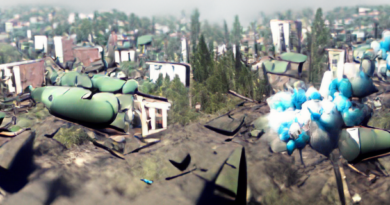Fact check: COVID-19 variants named after Greek letters, not military code
The claim: COVID-19 variant names are military codes
The World Health Organization said Nov. 29 that global spread of a new coronavirus variant, named omicron, could result in “severe consequences,” as early research indicates it’s possible that the variant could evade the immune system’s response and that it may be more transmissible than other variants.
But some online are claiming something more is at play, pointing to the variant’s name as supposed evidence.
“The new variants coming out are Military codes,” reads a Nov. 29 Facebook post “Each variant signals Military operations and White Hats chess counter movements.”
The Facebook post accumulated about 200 interactions in a week, but it spread vastly farther than that.
The Facebook user who shared the post attributed the information to “Whiplash347,” a user active on the encrypted messaging app Telegram utilized by the far-right. The original post on that site was viewed more than 31,000 times and makes references to QAnon – the false theory holds that political, media and industry elites are part of a satanic ring of pedophiles who influence the U.S. government as part of a “deep state.” That user lifted the post from another Telegram user, whose post was viewed more than 339,000 times.
The claim is baseless. The COVID-19 variants are named after Greek letters, not military codes.
Special access for subscribers! Click here to sign up for our fact-check text chat
USA TODAY reached out to the users who shared the post for comment.
Variants named after Greek alphabet
The Facebook user claims that omicron — or “omicrom,” as they misspell it — is military code for an operation to “control all grids around the world.”
The real meaning behind the word is much simpler.
The coronavirus variants are named after Greek letters once they surpass a threshold of “interest or concern.”
There are currently five named variants of concern, according to the WHO: alpha, beta, gamma, delta and omicron. The variants lambda and mu are classified as variants of interest, and the variants kappa, iota and eta — formerly variants of interest — are now listed as variants under monitoring. Epsilon, zeta and theta are listed as formerly monitored variants.
The omicron variant shares a name with the 15th letter in the Greek alphabet. Its literal translation in Greek is “small o,” according to the Merriam-Webster dictionary.
Why we’re using the Greek alphabet:WHO renames COVID-19 variants with Greek letter names to avoid confusion, stigma
Before the naming system was chosen for coronavirus variants in May, new strains were referred to by alphanumeric identifiers and the locations where they were discovered. The World Health Organization called the latter practice “stigmatizing and discriminatory.”
More on omicron:Omicron, the newest coronavirus variant: How to pronounce it, how it got its Greek name, and what it means
Once the 24 Greek letters are used up, the WHO will announce another naming system, USA TODAY previously reported.
The military alphabet — a phonetic alphabet also known as the North Atlantic Treaty Organization phonetic alphabet — does have some crossover with coronavirus variants, including alpha and delta. But it has been in use since 1956, long before COVID-19 existed, according to NATO archives.
Fact check:Image falsely ties WHO, independent organizations to COVID-19 conspiracy theory
“Omicron” is not part of the military alphabet.
Our rating: False
Based on our research, we rate the claim that the new COVID-19 variant names are military codes as FALSE. The COVID-19 variants are named after Greek letters.
Our fact-check sources:
- USA TODAY, Nov. 29, Global risk of omicron variant is ‘very high;’ Biden urges vaccinations, masks; judge blocks vaccine mandate: Latest COVID-19 updates
- USA TODAY, Jan. 14, Banned from Facebook and Twitter, pro-Trump extremists hatch Inauguration Day violence in dark reaches of the web
- WHO, May 31, WHO announces simple, easy-to-say labels for SARS-CoV-2 Variants of Interest and Concern
- WHO, retrieved Dec. 5, Tracking SARS-CoV-2 variants
- Merriam Webster, retrieved Dec. 5, Definition of “omicron”
- USA TODAY, June 1, WHO renames COVID-19 variants with Greek letter names to avoid confusion, stigma
- NATO, Oct. 20, 2016, THE NATO PHONETIC ALPHABET
- NATO, Feb. 21, 1956, Item SGM-0156-56 – PHONETIC ALPHABET FOR NATO USE
- USA TODAY, Feb. 7, What is QAnon? What to know about the baseless, far-right conspiracy theory connected to Marjorie Taylor Greene
Thank you for supporting our journalism. You can subscribe to our print edition, ad-free app or electronic newspaper replica here.
Our fact-check work is supported in part by a grant from Facebook.
*** This article has been archived for your research. The original version can be found at USA TODAY ***

